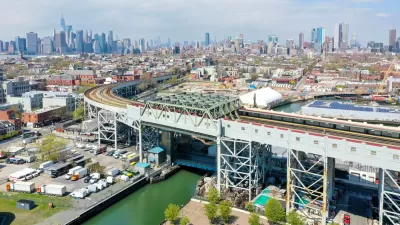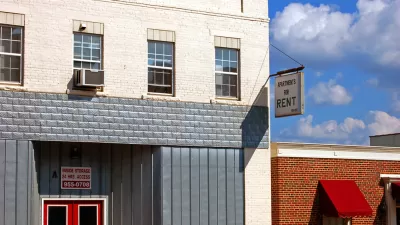San Francisco loves process and fears change. It's costing residents in more ways than housing, laments David Prowler, former Special Assistant to Mayor Willie Brown.
San Francisco is a city with one-tenth the population of New York City, and one-eighth the amount of transit rail track. However, it forces people to live outside the city, to commute farther to work or home. San Francisco's Planning Department processes three times more applications than New York City's—not because there are more projects but because nearly everything requires discretionary review, writes David Prowler, former Special Assistant to Mayor Willie Brown, former Planning Commissioner, and real estate consultant. He continues,
New York and San Francisco are both paying the price of gentrification and revival. People get pushed out, or crowded, or have long commutes. But the two cities are different in key ways. In San Francisco, if you want a walkable neighborhood with cafes and bakeries and the amenities that Jane Jacobs championed, you have few choices. San Francisco doesn’t have the equivalent of a Cobble Hill, a Jackson Heights, or a Hoboken, and lacks the reliable, regional public transit system that would make longer commutes bearable.
The reason for this difference, he argues, is fear of change. It has become the city's culture, its DNA. San Franciscans use process to thwart change:
Paradoxically, in a city famed for new ideas, resistance to change is a cherished San Francisco value. . . That’s because public review—with generous opportunities to appeal—is a cherished sport here.
While Prowler is not hopeful that the city's dysfunctional resistance to change will soon subside, he believes some key areas need to be addressed:
Most development projects should go forward if they comply with planning codes. The arduous, costly, and risky review and appeals processes should be streamlined. The California Environmental Quality Act should be amended so that it encourages smart growth rather than sprawl. Small infill projects should be exempted.
FULL STORY: San Francisco: The Status Quo City

Maui's Vacation Rental Debate Turns Ugly
Verbal attacks, misinformation campaigns and fistfights plague a high-stakes debate to convert thousands of vacation rentals into long-term housing.

Planetizen Federal Action Tracker
A weekly monitor of how Trump’s orders and actions are impacting planners and planning in America.

In Urban Planning, AI Prompting Could be the New Design Thinking
Creativity has long been key to great urban design. What if we see AI as our new creative partner?

Massachusetts Budget Helps Close MBTA Budget Gap
The budget signed by Gov. Maura Healey includes $470 million in MBTA funding for the next fiscal year.

Milwaukee Launches Vision Zero Plan
Seven years after the city signed its Complete Streets Policy, the city is doubling down on its efforts to eliminate traffic deaths.

Portland Raises Parking Fees to Pay for Street Maintenance
The city is struggling to bridge a massive budget gap at the Bureau of Transportation, which largely depleted its reserves during the Civd-19 pandemic.
Urban Design for Planners 1: Software Tools
This six-course series explores essential urban design concepts using open source software and equips planners with the tools they need to participate fully in the urban design process.
Planning for Universal Design
Learn the tools for implementing Universal Design in planning regulations.
Gallatin County Department of Planning & Community Development
Heyer Gruel & Associates PA
JM Goldson LLC
City of Camden Redevelopment Agency
City of Astoria
Transportation Research & Education Center (TREC) at Portland State University
Jefferson Parish Government
Camden Redevelopment Agency
City of Claremont




























